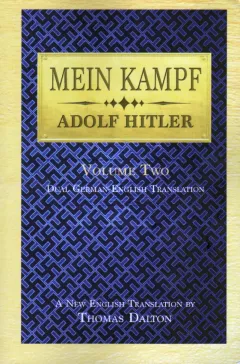FROM MEIN KAMPF, SUMMARY OF CHAPTER SIX OF VOLUME TWO, pages 185-215 of the Thomas Dalton dual-translation. (See here for series introduction.)
______________________________
[O]UR FIRST GREAT meeting [was] in the banquet hall of the Hofbräuhaus on 24 February 1920.
6.1 Fight against Poisonous Propaganda
There was a meeting every week, almost always in that hall, and each time it was fuller than before, and the people more attentive! […]
We gave greatest attention to the peace treaties … in those days, a public mass meeting … with the topic 'The Peace Treaty of Versailles' meant an attack on the Republic … one could expect an immediate and almost stereotyped reply: 'And Brest-Litovsk?' 'Brest Litovsk?'* … One wanted to pound one's head against a wall in despair over these people! They would neither listen nor understand that Versailles was a scandal and a disgrace, a dictate that marked an unprecedented thievery of our people. … the enemy's poisonous propaganda had robbed these people of their reason.
* The Treaty of Brest-Litovsk was signed on 3 March 1918. It marked Russia's withdrawal from World War One, and was cast in very favorable terms for Germany.
[…]
I then saw clearly that the question of war guilt had to be cleared up for the small kernal of our movement—and cleared up in light of historical truth. … At the time, the masses viewed this peace as a success of democracy. Therefore we had to form a united front against it, and engrave ourselves into men's minds as an enemy of this treaty.
6.2 Against the Tide
The NSDAP shouldn't be the servant of public opinion, but rather must dominate it. … While the international world-Jew slowly but surely strangles us, our so-called patriots shout against a man and his system with the courage to free themselves from the shackles of Jewish Freemansonry … and to oppose nationalist resistance against this international world-poison. But weak characters were too tempted to sail with the wind and capitulate to the clamor of public opinion. … Thus it was necessary to grasp the movement with an iron hand, in order to save it from a path of ruin.
6.3 Politics of the Wide View
[…] I quickly learned something important, namely to snatch the enemy's weapons of reply from his own hands. One could soon see that our adversaries—especially the discussion leaders—were furnished with a definite 'repertoire' of arguments that were being constantly repeated. ... We were thus able to recogrnize the incredible discipline of the enemy's propaganda, and I'm proud to this day that I discovered a means, not only of making this propaganda ineffective, but of beating its makers with it. … It was necessary to mention all the possible objections and show their inconsistency; this made it easier to win over an honest listener by disposing of all the doubts that had been imprinted on his memory. That which he had learned was automatically refuted, and this made him all the more attentive to the speech.
6.4 Enlightenment about the Peace Treaties
I henceforth spoke of the 'Treaties of Brest-Litovsk and Versailles.' … people really knew nothing about the Treaty of Brest-Litovsk, and that clever party propaganda had succeeded in presenting it as one of the most scandalous acts of violence in the world. The persistent repetition of this lie to the broad masses caused millions of Germans to see the Treaty of Versailles as a just retribution for the crime that we had committed at Brest-Litovsk. … this was also the reason why the shameless and monstrous word 'reparations' came into common use in Germany. […] I compared the two treaties with one another, point by point, showing the immense hunanity of the one treaty and the unhuman barbarity of the other—and the result was striking. … A great lie had once again been torn from the hearts and minds of a crowd of thousands, and a truth implanted in its place.
[…]
Furthermore, these gatherings gave me the benefit of gradually transforming myself into a speaker at mass meetings, and I became skilled in the pathos and gesture demanded by large halls with thousands of people... at that time I found no party engaged in explaining things to the people in this way. […]
The leaflet was also put to use … The first meetings were distinguished by the tables covered with leaflets, newspapers, and pamphlets of every kind. But we relied mainly on the spoken word.
6.5 Speech More Effective than Writing
[…]
One must also realize that the mass in itself is mentally inert, that it remains attached to its old habits and isn't naturally inclined to read something that doesn't conform to its own beliefs, especially when it doesn't contain what they hoped for. Therefore, an essay … is for the most part read only by those who are sympathetic. Only a leaflet or poster, by its brevity, can hope to arouse a momentary interest in those who think differently. The visual image, in all its forms, has better prospects—including films.
[…]
Only through its capacity for adaptability does writing approach speech.
[…]
Not infrequently, it's a case of overcoming ingrained prejudices that are mostly unconscious and are supported by emotion rather than reason. … False ideas and ignorance may be removed by instruction. Emotional resistance, never. Only an appeal to these hidden forces themselves will be effective; and the writer can scarcely ever achieve this, but rather almost exclusively the speaker.
6.7 Psychological Conditions of Effective Speech
Success depends on imponderable conditions and influences … even the time of day at which the speech is delivered has a decisive influence on its results. ... [T]he performance's impression in the afternoon isn't nearly as great as in the evening. The same is true of motion pictures.
[…]
[W]e are dealing with the problem of influencing man's freedom of will. … The superior rhetorical art of a masterly preacher will succeed better in winning over to a new will those who have naturally been subject to a weakening of their forces of resistance.
[…]
The illiterate masses weren't aroused to Communist revolutionary enthusiasm by the theoretical writings of Karl Marx but rather by the promises of paradise made to the people by thousands of agitators in the service of an idea.
6.9 Necessity of Mass Meetings
Only in the rarest cases will a convinced Social Democrat or fanatical communist be induced to acquire an understanding of our world-conception ... by procuring and reading one of our pamphlets or even one of our books. […]
It's totally different with the 'spoken' leaflet! Especially if given for free … Perhaps the reader, after having perused such a leaflet more or less thoughtfully, will have new viewpoints and attitudes, even toward a new movement. But these, even in the best case, will only provide the slightest impulse, and nothing definitive. The leaflet … can become effective only by subsequently causing the reader to become more fundamentally informed and educated. This is, and will always be, the mass meeting.
Mass meetings are also necessary for the reason that the individual … acquires a picture of a great community; this has a strengthening and encouraging effect on most people.
[…]
The National Socialist movement should never forget this, and it should never allow itself to be influenced by these bourgeois simpletons … who have foolishly gambled away a great State—along with their own existence and the rule of their own class.
- Printer-friendly version
- 749 views






We certainly need a Hitler in
David R. Westerlund
We certainly need a Hitler in 2020.
Indeed Dave. I see no problem
carolyn
Indeed Dave. I see no problem with utilizing his ideas, methods and practices today. They're still good, still workable. And in fact, Donald Trump does that more than anyone else in a long time ... and he's been successful.
The problem is the Jewish straight-jacket on everything called NS or Nazi and the Deep State. It doesn't come from Trump and that's why I support him. If it were up to Trump, we would be able to talk about Hitler and his Reich, good and bad, as much as we wanted.